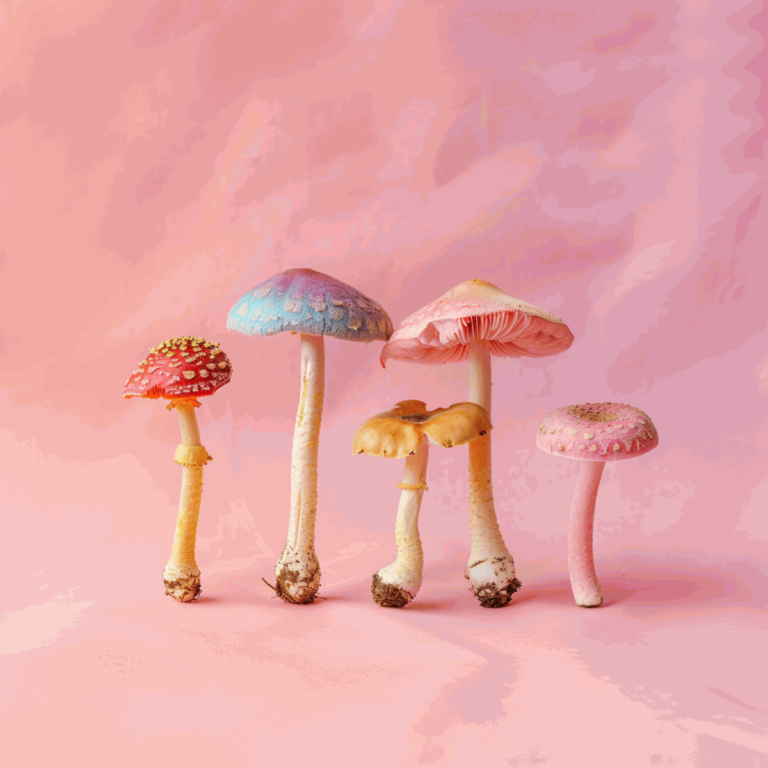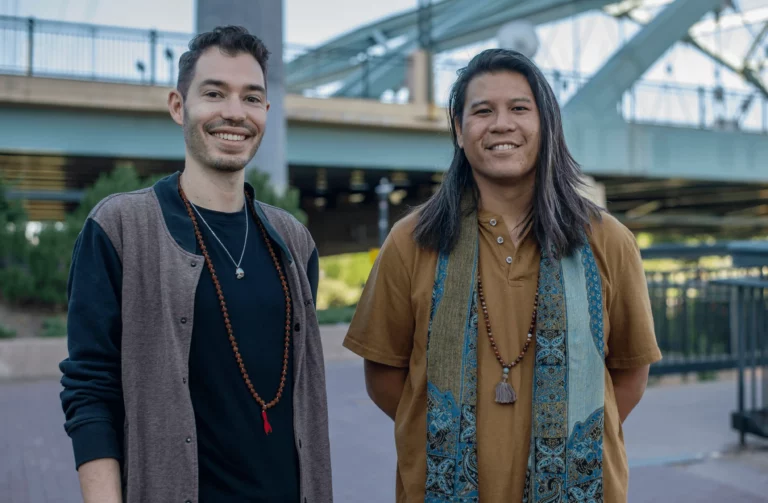Before reading this article, let’s take a moment to find stillness together. Take a moment to notice your breath, flowing in and out of your body. Relax into yourself. Note how you feel in this present moment, without judgment.
(Pause here to listen to the sound of your breath for 10 counts.)
Beautiful job! You just engaged in mindfulness– an active practice that grounds, observes, and listens to Truth as it is. Mindfulness requires nothing more than what you already have, right here, right now. It’s an ongoing discipline of mind that nurtures our soul and preserves authenticity.
As ‘mindfulness’ becomes an increasingly popularized term, it’s important we get clear on what exactly mindfulness is. In this article, we’ll explain the concept and its benefits, alongside current research proving the highly synergistic potential of psychedelics and mindfulness practices.
What is Mindfulness?
Mindfulness has its roots in ancient philosophy found throughout the east, dating back to around 2,500 years ago. Within the traditions of Hinduism, Tibetan Buddhism, Japanese Zen, and others, we see the Pali term sati (smriti in Sanskrit) arise, describing a state of conscious awareness, or what we may call ‘mindfulness’ in English.
This state of conscious awareness emerges when one deliberately pays attention to the present experience with nonjudgement, along with an attitude of equanimity, where one neither opposes nor favors the object of attention. It’s important to acknowledge and honor these roots, as many ancient practices have been westernized and capitalized over time.
This being said, practicing mindfulness as a state of awareness, regardless of its origin, has similar attributes and benefits. To define mindfulness clearly, it is “the awareness that emerges when deliberately paying attention to the experience of the present moment with curiosity and without judgment” (Kabat-Zinn, 2003, p. 145).
When one engages in mindfulness practices, there are certain aspects that define the process. Jon Kabat-Zinn, who was a student of Zen Buddhist teachers, and is the founder of MBSR (mindfulness-based stress reduction), gives us 7 principles of engaging in mindfulness practice, which read as follows:
- Non-judgment. Be an impartial witness to your own experience. Become aware of the constant stream of judging and reacting to inner and outer experience.
- Patience. A form of wisdom- patience demonstrates that we accept the fact that things sometimes unfold in their own time. Allow for this.
- Beginner’s Mind. Remaining open and curious allows us to be receptive to new possibilities and prevents us from getting stuck in the rut of our own expertise.
- Trust. Develop a basic trust with yourself and your feelings. Know that it’s OK to make mistakes.
- Non-Striving. The goal is to be with yourself right here, right now. Pay attention to what is unfolding without trying to change anything.
- Acceptance. See things as they are. This sets the stage for acting appropriately in your life regardless of what is happening.
- Letting Go. When we pay attention to our inner experience, we discover there are certain thoughts, emotions, and situations the mind wants to hold onto. Let your experience be what it is right now.
These key principles help to give us an idea of what exactly mindfulness practice looks and feels like. Out of curiosity, do these principles remind you of anything? Perhaps they sound like qualities that are enhanced by other consciousness-altering activities.
The Benefits of Mindfulness Practices
Now that we’ve formed a clear idea of what exactly mindfulness is, let’s talk about the benefits. Through various forms of research, mindfulness has been shown time and time again to have a positive effect on an individual’s subjective sense of well-being. In studies comparing those that meditate on a regular basis to non-mediators, those who mediate report:
- Significantly higher levels of mindfulness, self-compassion, and overall sense of well-being.
- Significantly lower levels of negative psychological symptoms, rumination, thought suppression, fear of emotion, and difficulties with emotion regulation.
Correlational research on those who possess trait mindfulness (measured by various questionnaires that assess mindfulness as a general, trait-like tendency to be mindful in daily life) tend to also rank highly in psychological well being.
Trait mindfulness has also been associated with higher levels of life satisfaction, agreeableness, conscientiousness, acceptance, vitality, self esteem, empathy, sense of autonomy, competence, optimism, and pleasant affect.
These studies have demonstrated significant negative correlations between mindfulness and depression, neuroticism, absent-mindedness, dissociation, rumination, cognitive reactivity, social anxiety, difficulties in emotion regulation, experiential avoidance, alexithymia, intensity of delusional experience in the context of psychosis, and general psychological symptoms.
Mindfulness is found to enhance emotional reactivity and improve behavioral regulation. Other studies have shown mindfulness practices and meditation to provide relief for anxiety, depression, and other mental health challenges.
Mindfulness practices have also been shown to produce neuroplastic changes, with neuroimaging studies showing brain connectivity changes in meditators. Now that we’ve discussed the components involved in mindfulness practice and benefits associated with it, it’s time we take a dive deep into the heart and soul of this article. Can you guess what’s next?
How Psychedelics Can Enhance Mindfulness Practices
Psychedelics and mindfulness practices have been proven to affect many of the same brain regions in many of the same ways. Both have been scientifically evidenced to increase behavioral self-regulation, acceptance, even mindful and metacognitive awareness.
Like meditation, psychedelics promote present-moment awareness and produce antidepressant effects. They share a similar ability to alter consciousness, specifically in relation to self-consciousness, sometimes producing something called ‘no self’ or ‘self-loss’, or ‘ego death’.
Various aspects of self-consciousness, including narrative aspects linked to autobiographical memory, self-related thoughts and mental time travel, and embodied aspects rooted in multisensory processes, may be differently affected by psychedelics and meditation practices (Millière et al., 2018).
While consciousness and how this aspect of the mind functions in general is still yet to be fully understood, one can see that both psychedelics and mindfulness have the ability to alter consciousness.
Again, exactly how meditation and psychedelics alter consciousness is still being studied, but the staggering similarities behind their mechanisms and beneficial outcomes, has led to scientists theorizing the synergistic effects when both are used in combination, and the potential therapeutic benefit.
Current Research Linking Mindfulness to Psychedelics
A systematic review was conducted to explore the link between psychedelics and the characteristics of mindfulness. In this review, 13 studies were included that examined the ability of psychedelics to increase mindfulness.
There was variability in participant characteristics, psychedelic administration method, and how they measured mindfulness. Overall, it was found that the ingestion of psychedelics was associated with an increase in mindfulness, specifically relating to domains of acceptance ( encompassing non-judgement of inner experience and non-reactivity) (Radakovic et. al, 2022).
In a study evaluating the effects of psilocybin on mindfulness, Smigielski and colleagues found that psilocybin, administered to experienced mindfulness meditation practitioners during a meditation retreat, was associated with increased meditation depth, higher post-intervention trait mindfulness, and improved psychosocial functioning at 4 months follow-up, compared to a placebo condition.
Furthermore, Smigielski and colleagues noted that, compared to non-meditators receiving the same dose of psilocybin, mindfulness meditation practitioners indicated higher ratings of blissful state, spiritual experience, and feelings of unity associated with their psilocybin session.
They also indicated less anxiety surrounding “ego-dissolution” (an experience of fragmenting and dissipating selfhood) (Smigielski et al., 2019). In one study on the effects of ayahuasca on mindfulness, 25 individuals were asked to fill out mindfulness questionnaires before and 24 hours after an ayahuasca session.
The results of the questionnaires indicated a reduction in judgmental processing of experiences and in inner reactivity, along with a significant increase in decentering ability.
The study explains how these changes are classic goals of conventional mindfulness training, and the scores obtained are in the range of those observed after extensive mindfulness practice (Soler et al., 2016).
The Relationship Between Psychedelics and Mindfulness
While the research points towards psychedelics and mindfulness being linked, scientists are still investigating how exactly. What follows are various theories and explanations as to how and why ingesting psychedelics and practicing mindfulness have the potential to have a synergic, beneficial, therapeutic effect when paired together.
Psychedelics and Mindfulness – The Compass and The Vehicle
The Compass and The Vehicle is a popular way which many perceive and explain the relationship between these two consciousness-altering activities.
Note. Figure 1 (Payne, Chambers & Liknaitzky, 2021)
Metaphorically, on the journey toward mental health and well-being, psychedelics may serve the role of Compass (initiating, motivating, and steering the course of mindfulness practice).
Mindfulness interventions serve the role of Vehicle (integrating, deepening, generalizing, and maintaining the novel perspectives and motivation instigated by psychedelic experience) (Payne, Chambers & Liknaitzky, 2021).
By this view, psychedelics and mindfulness practices can serve as tools for embodying an improved state of being. They are different tools, equally important, and both are necessary for movement and expansion.
Psychedelics and Mindfulness on The Default Mode Network (DMN)
While this Compass and Vehicle metaphor does provide a beautiful visual, there’s also scientific thought of what lies deeper within this matter. Mindfulness meditation and psychedelic practices are both associated with specific neurobiological changes (Payne, Chambers & Liknaitzky, 2021).
These changes included reduced Default Mode Network (DMN) activation and greater functional connectivity between DMN structures and task-positive networks such as the dorsolateral prefrontal cortex. The Default Mode Network (DMN) plays a crucial role in our self perception, specifically when we’re inwardly focused. DMN overactivity is often responsible for ruminating thoughts.
When the DMN is deactivated or when its function is reduced, whether through psychedelics or other mindfulness practices, we feel more at ease. We’re less anxious and rigid, more in the flow of life, moving without resistance and with less internal conflict. We are present.
Psychedelics Can Assist in Mindful State Recognition
Another way psychedelics may help individuals enhance mindfulness is through ‘Mindful State Recognition’. Psychedelics can produce potent non-ordinary states of consciousness and psychological effects that resemble those associated with deep meditative states. These psychedelic experiences can act as a point of reference to help guide future meditative practice, especially for beginner meditators.
Psychedelics Enhance Mindfulness Motivation
Psychedelics may also act as an inspiring or catalyzing force for people to sustain their mindfulness practice. Research indicates that recognizing the potential benefits of mindfulness (which can be brought about through psychedelic experiences) is a significant predictor of sustained meditation practice.
Having a psychedelic experience has also been associated with changing one’s priorities and values so that they are in more alignment with oneself, which may also contribute to the motivation for ongoing mindfulness meditation practice (Payne, Chambers & Liknaitzky, 2021).
While we are still researching mindfulness and psychedelics, and trying to understand consciousness at large, there are questions that may remain mysteriously unanswered. Hopefully though, as research into the potential of combining psychedelics and mindfulness continues, there could be implications for clinical practice, as the beneficial outcomes of preliminary research is clear.
Explore How it Feels to be Connected
If you’re looking for an alternative way to deepen your mindfulness, or perhaps jumpstart a new meditative practice, Psychedelic Passage can help guide your therapeutic psychedelic journey.
Our pre-vetted network of psychedelics facilitators are experienced and qualified in servicing psychedelic journeyers. They’ll walk you through intention-setting, preparation, integration, and they are present for your psychedelic experience.
If you’re interested in using plant medicine to increase mindfulness, or to reap their mental, physical, and spiritual benefits, we empower you to book a consultation with one of our knowledgeable psychedelic concierges. Check out our resources page for more information on how psychedelic therapy might help you move closer toward your goals.



